Religion in Israel
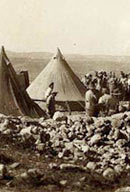 The Romance of Gush Etzion
The Romance of Gush EtzionFriday, September 3, 2010 by Aryeh Tepper | Jewish Ideas Daily » Daily Features
The modern return of the Jewish people to their homeland succeeded thanks to the extraordinary tenacity of pioneering individuals who, in a dangerous environment, created new communities from scratch. One such community, or rather series of communities, is the Etzion district—in Hebrew, Gush Etzion—located along the ancient mountain route between Jerusalem and Hebron. The first three communities built by Jewish settlers were completely destroyed by Arabs. The fourth still stands today.
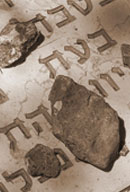 Cemetery Politics
Cemetery PoliticsWednesday, September 1, 2010 by Allan Nadler | Jewish Ideas Daily » Daily Features
Among the many bones its various enemies pick with the Jewish state, one has been much in the news lately: bones, very dry bones, residing in cemeteries both real and imagined all across the country.
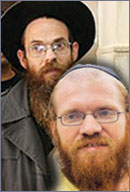 A Grim Teaching
A Grim TeachingFriday, August 27, 2010 by Yehudah Mirsky | Jewish Ideas Daily » Daily Features
Every first-year law student knows that hard cases make bad law. In Israel, a particularly hard case lies in the ongoing controversy around an inflammatory Hebrew-language volume of Jewish religious law (halakhah) that offers justifications for violent treatment of non-Jews in general and of Israel's foes in particular. The debate has highlighted longstanding divisions within Israeli society; now that the courts and the police have gotten into the act, it has also highlighted the difficulties of drawing meaningful lines between free speech and incitement.
 Rank Rivalries
Rank RivalriesWednesday, August 11, 2010 by Elliot Jager | Jewish Ideas Daily » Daily Features
A bare majority of Americans know that General David Petraeus commands U.S. forces in Afghanistan. Fewer, surely, would be able to name Navy Admiral Mike Mullen as the chairman of the Joint Chiefs of Staff. In Israel, by contrast, the chief of the general staff of the country's defense forces is a household name—for he is the unique individual in public life who is single-mindedly focused on military security, the reassuring figure, above the political fray, to whom Israelis can look with confidence at times of threat to their national safety.
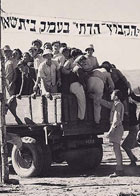 The Religious Kibbutz
The Religious KibbutzThursday, April 15, 2010 | Jewish Ideas Daily » Daily Features
Alongside the centennial of the kibbutz movement, another, humbler jubilee is being marked: the 80th anniversary of Ha-kibbutz Ha-dati, the religious-kibbutz movement. A unique blend of nationalism, socialism, and religion, it has generated a legacy whose significance reaches well beyond its sixteen member communes. The kibbutz movement as a whole was, from its inception, deeply committed to religion—that is, the Tolstoyan religion of labor. The religious kibbutzim strove to wed this new religion with the old one, and thus to remake both. The aim was a return to the land that would at once revitalize the ancient moral-religious energies of the Torah and issue a...
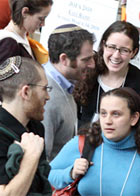 Orthodoxies
OrthodoxiesFriday, April 2, 2010 | Jewish Ideas Daily » Daily Features
"Is Modern Orthodoxy an Endangered Species?" This was the question posed at a conference yesterday in Jerusalem. Some speakers suggested that the very term "Modern Orthodoxy" doesn't fit the Israeli context or even accurately describe this slice of Jewish life. But what, indeed, is it? Like nearly all denominational labels, this one is a product of the ideological and political debates of the 19th century, as the radical options posed by modernity—including the possibilities of assimilation without conversion to Christianity and of political self-determination—scrambled traditional categories as never before. In this unprecedented situation, adherents of tradition in general and of traditional Jewish law...
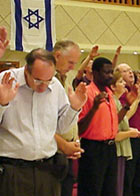 Marranos in Reverse?
Marranos in Reverse?Tuesday, March 9, 2010 | Jewish Ideas Daily » Daily Features
At first blush, the blog reads like any modish commentary on the weekly Torah portion, complete with knowing references to the Mishnah and the building of the Tabernacle in the desert. Only upon closer examination does it become evident that the discussion of the tabernacle as a medium for drawing nearer to God is a precursor to the claim that, nowadays, God can be worshipped "directly." The blogger is a follower of "Yeshua"—a Jewish believer in Jesus. In Jewish eyes they are apostates, but a group of "Messianic Jews" living in Israel say they follow authentic Jewish lives in the footsteps...
 Holy Societies
Holy SocietiesFriday, February 19, 2010 | Jewish Ideas Daily » Daily Features
In the Hebrew calendar, Sunday February 21 is the seventh day of Adar, the date traditionally marking the death of Moses on Mount Nebo, overlooking Canaan, alone with God. The Lord's personal oversight of Moses' interment, in a place "unknown to this day" (Deuteronomy 34:6), inspired the rabbis of the Talmud to praise the act of burying the dead with dignity as an expression of true (because unrecompensed) kindness and indeed of imitatio dei, the injunction to follow God's ways. So it is that the seventh day of Adar is designated by tradition to honor the institution of the Hevra Kadisha, the "holy society"...
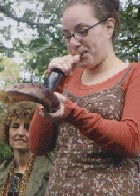 New Communities
New CommunitiesTuesday, February 16, 2010 | Jewish Ideas Daily » Daily Features
Recent years have seen a surge of new Jewish communities: experiments in communal living like Moishe House, urban kibbutzim in Israel's inner cities, back-to-nature programs combining organic farming, kashrut, and "eco-justice," and, perhaps most notably, independent minyanim in the U.S., Israel, and elsewhere. These last—communities focused principally or exclusively on prayer—shun not only the formality and organizational heft of most synagogues but also the labels and authority of denominational Judaism. Some of the most prominent have been created by Orthodox Jews seeking to make room for greater participation by women; others comprise young people experimenting with their own forms of...
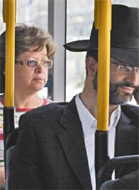 Buses and Boundaries
Buses and BoundariesThursday, February 4, 2010 | Jewish Ideas Daily » Daily Features
This morning, Israel's Supreme Court reconvenes on the matter of "mehadrin" buses: public transportation in which women are expected, ostensibly on a voluntary basis, to enter from and sit in the back. The Court's hearing is in response to a decision earlier this week by the Transportation Ministry to grant formal recognition to such bus lines, several dozen of which now operate. Powerful segments of the ultra-Orthodox (Haredi) community argue that such segregation is the only way to insure appropriate modesty (tzni'ut) between the sexes. The degree to which Haredim in general agree with this position is not entirely clear, but the...
Editors' Picks
Multicultural Mass Associated Press. The past two decades have seen one of the most significant influxes of Christians into the Holy Land since the Crusades, creating a wholly new, multilingual and multicultural Christian landscape.
To Ransom or Not to Ransom? Aryeh Tepper, Jewish Ideas Daily. As demands for the release of captive soldiers grow ever more exorbitant, when is the price simply too high to pay?
Shaken, Not Stirred David Rosenberg, Media Line. In developing innovative storage techniques for lulavim (palm fronds), Israel's technological prowess went head-to-head against an Egyptian embargo, and won.
Small Victory Anshel Pfeffer, Haaretz. By ostentatiously listing himself as "without religion," the novelist Yoram Kaniuk has confirmed the failure of secular Israelis to provide an alternative vision of Judaism.
Declaring Death Gil Student, Torah Musings. In the 1960's, Israeli doctors began aggressively promoting the view that declaration of death was a purely medical matter. But it wasn't easy to enlist rabbis in their cause.
Non serviam Tomer Zarchin, Haaretz. In granting the writer Yoram Kaniuk the right to be officially registered as "without religion" (rather than Jewish), Israel has taken a giant step toward the legal separation of religion and state.
The Audacity of Faith Yehudah Mirsky, Jewish Review of Books. A biography of Yehuda Amital reveals a daringly exuberant figure whose journey led from a Nazi labor camp to a unique and controversial place in Israeli religious and political life.
Jewish-Muslim Metal Naama Shilony, Yesim Dikmen, Reuters. Lyrics drawn from the Hebrew liturgy, the Quran, and other religious texts feature in the repertoire of an Israeli band whose Arab fans travel to Turkey to hear it.
By Faith Alone Israel Drazin, Jewish Ideas and Ideals. The late Rabbi Yehuda Amital was an influential Israeli educator, instrumental in integrating yeshiva study with military service, and an opponent of rabbis' setting public policy.
The Scandal of Particularity Seth Chalmer, First Things.
Despite what some modern Jews think, particularism is not the enemy of universalism; quite the contrary.

